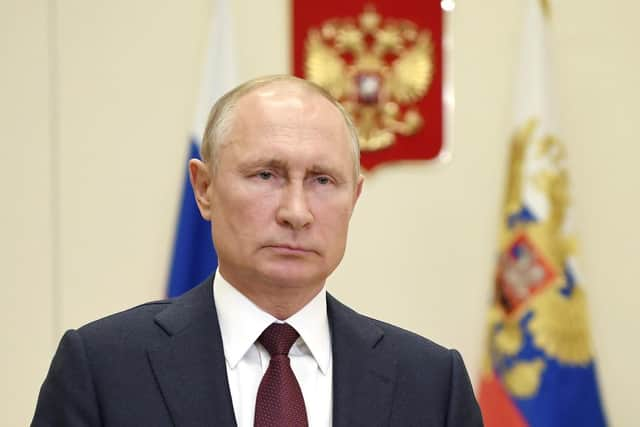'No-one wanted to know' - Government 'actively avoided' investigating alleged Russia interference in EU referendum
The much-anticipated Russia report, released by the Intelligence and Security Committee (ICS) today, found that it was impossible to know whether Russia interfered with the 2016 EU Referendum simply because there had been no assessment of whether that had been the case, a position which committee member and Labour MP Kevan Jones said was “shocking”.
Mr Jones said: “The outrage is that no-one wanted to know if there was interference.”
Advertisement
Hide AdAdvertisement
Hide AdFellow committee member and SNP MP Stewart Hosie added: “Noone wants to touch the issue with a 10ft pole.”


He claimed the Government has "actively avoided looking for evidence that Russia interfered" adding any conclusion was "meaningless if they haven't looked for it".
The report said: “Until recently, the Government had badly underestimated the Russian threat and the response it required.”
The committee found that until recent years ministers did not recognise the threat Russia posed, and had not taken any steps to investigate what influence the country’s disinformation campaigns may have had on key political decisions such as Brexit.
Advertisement
Hide AdAdvertisement
Hide AdMr Hosie said: “There must now be one [an assessment] and the public must be told the result of that assessment.”
But in a 20-page response the Government said: “We have seen no evidence of successful interference in the EU Referendum.”
It said intelligence and security agencies produce and contribute to regular assessments of the threat posed and added: “Given this long standing approach, a retrospective assessment of the EU Referendum is not necessary.”
The ISC report said there was “credible open source commentary suggesting that Russia undertook influence campaigns in relation to the Scottish independence referendum in 2014”.
Advertisement
Hide AdAdvertisement
Hide AdAnd it added: “It was only when Russia completed a ‘hack and leak’ operation against the Democratic National Committee in the US [in 2016] – with the stolen emails being made public a month after the EU referendum – that it appears that the Government belatedly realised the level of threat which Russia could pose in this area.”
The report said lessons were learned from the US experience but “had the relevant parts of the Intelligence Community conducted a similar threat assessment prior to the referendum, it is inconceivable that they would not have reached the same conclusion as to Russian intent, which might then have led them to take action the protect the process.”
And it warned: “Russia’s cyber capability, when combined with its willingness to deploy it in a malicious capacity, is a matter of grave concern, and poses an immediate and urgent threat to our national security.”
The report itself has been released nine months after it was completed, but Mr Jones said there was “no reason” for the delay in the publication.
Advertisement
Hide AdAdvertisement
Hide AdHe told reporters as the report was released that claims by the Prime Minister it required six weeks to get his confirmation for the report were “categorically not true”.
He also said that claims by Number 10 the report needed to be further circulated for comment in Government were “not true”.
Mr Jones said the Intelligence and Security Committee’s Russia report was sent to the Prime Minister on October 17.
He said Boris Johnson’s confirmation for its release was received the day after the general election in December, having taken “record time”.
Advertisement
Hide AdAdvertisement
Hide AdCommittee chairman Dr Julian Lewis said the ISC has been subjected to “unprecedented delay and dislocation”.
He told journalists on Tuesday: “This really must never happen again. And the sooner normal relations are restored between this committee and the Government, the better it will be for all concerned.
“That prospect has not been helped by the Government refusing to tell us what was in the written ministerial statement about this Russian report which the Government chose to table at the Commons at 10.30 this morning to clash with the start of this event.”
The report also highlighted how successive Governments “have welcomed oligarchs and their money with open arms” which had led to a web of “enablers” in London “who are - wittingly or unwittingly - de facto agents of the Russian state”.
Advertisement
Hide AdAdvertisement
Hide AdAnd committee members expressed fears that “several members of the Russian elite who are closely linked to Putin are identified as being involved with charitable and/or political organisations in the UK, having donated to political parties, with a public profile which positions them to assist Russian influence operations”.
The report said: “It is notable that a number of Members of the House of Lords have business interests linked to Russia, or work directly for major Russian companies linked to the Russian state – these relationships should be carefully scrutinised, given the potential for
the Russian state to exploit them.”
In its response, the Government said: “The Government has long recognised there is an enduring and significant threat posed by Russia to the UK and its allies, including conventional military capabilities, disinformation, illicit finance, influence operations, and cyber-attacks. As such, Russia remains a top national security priority for the Government.”
Comment Guidelines
National World encourages reader discussion on our stories. User feedback, insights and back-and-forth exchanges add a rich layer of context to reporting. Please review our Community Guidelines before commenting.